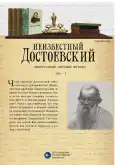Dostoevsky’s idea: deeper understanding of Russia as an educational challenge learning
- Authors: Zakharov V.N.1
-
Affiliations:
- Petrozavodsk State University
- Issue: Vol 3, No 3 (2016)
- Pages: 3-13
- Section: Articles
- URL: https://journal-vniispk.ru/2409-5788/article/view/290279
- DOI: https://doi.org/10.15393/J10.ART.2016.2781
- ID: 290279
Cite item
Full Text
Abstract
Among Dostoevsky’s manuscripts, a seemingly insignificant document can be found. It consists of five pages torn out by the writer from his sketchbook — apparently, in August 1864. This document demonstrates how Dostoevsky the editor would work with authors, guide them and shape the policy of his journal. In his notes on classical and real education, Dostoevsky expressed the idea and conception of the article, which he commissioned to be written by
A. A. Golovachov, a Moscow litterateur. Despite its brevity, the text reads as a complete statement. In it, Dostoevsky puts forward his vision of the new education in Russia which must overcome the “Roman and Germanic” influence, as well as teach young people how to become Russian “through learning” (if they cannot be Russians a priori), and how to strive for “deeper understanding of Russia” in schools and universities. Later, in his 1880 sketchbook, Dostoevsky took these ideas a step further in an essay titled “To study Russia”. Dostoevsky’s pedagogical ideas have not lost their relevance for contemporary Russia: his call for a deeper study and understanding of Russia as the main challenge for national education still remains largely unheeded.
Keywords
About the authors
Vladimir N. Zakharov
Petrozavodsk State University
Author for correspondence.
Email: vnz01@yandex.ru
Doctorof Philology, Professor of the Department of Russian Literature and Journalism
Russian Federation, PetrozavodskReferences
- Dostoevskiy F. M. Polnoe sobranie sochineniy: v 30 tomakh [The Complete Works: in 30 Vols]. Leningrad, Nauka Publ., 1980, vol. 20. 432 p.
- Zakharov V. N. Genial’nyy fel’etonist [The Brilliant Feuilletonist]. Dostoevskiy F. M. Polnoe sobranie sochineniy: v 18 tomakh [Dostoevsky F. M. The Complete Works: in 18 Vols]. Moscow, Voskresen’e Publ., 2004, vol. 4, pp. 501–513.
- Zakharov V. N. Idei «Vremeni», dela «Epokhi» [Ideas of “Time”, Deeds of “Epokha”]. Dostoevskiy F. M. Polnoe sobranie sochineniy: kanonicheskie teksty [Dostoevsky F. M. The Complete Works: Сanonical Texts]. Petrozavodsk, Petrozavodsk State University Publ., 2004, vol. 5, pp. 695–712.
- Zakharov V. N. Triumf anonimnogo Avtora [The Triumf of an Anonymous Author]. Dostoevskiy F. M. Polnoe sobranie sochineniy: v 18 tomakh [Dostoevsky F. M. The Complete Works: in 18 Vols]. Moscow, Voskresen’e Publ., 2004, vol. 5, pp. 521–539.
- Nechaeva V. S. Zhurnal M. M. i F. M. Dostoevskikh «Epokha». 1864–1865 [The Magazine of Mikhail and Fyodor Dostoevsky “Epokha”. 1864–1865]. Moscow, Nauka Publ., 1975. 302 p.
- Ornatskaya T. I. Redaktsionnyy literaturnyy kruzhok F. M. i M. M. Dostoevskikh (1860–1865 godov) [Editorial Literary Circle F. M. and M. M. Dostoevsky (1860–1865)]. Dostoevskiy. Materialy i issledovaniya [Dostoevsky. Materials and Researches]. Leningrad, 1988, issue 8, pp. 247–262.
- Strakhov N. N. Vospominaniya o Fedore Mikhayloviche Dostoevskom [Memories of Fyodor Dostoevsky]. Polnoe sobranie sochineniy F. M. Dostoevskogo [The Complete Works of Dostoevsky]. St. Petersburg, Tipografiya A. S. Suvorina, 1883, vol. 1, pp. 169–329.
- Tunimanov V. A. Zavershenie mnogoletnego truda [The Result of Years of Work]. Russkaya literatura, 1976, no. 2, pp. 199–206.
Supplementary files










